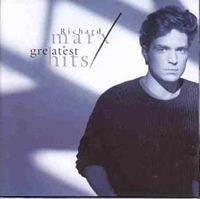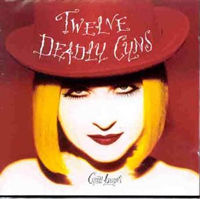Jason Maloney reviews
V o l u m e # 2 4 Chart Date: July 4th 1992 Online Date: 8th July 2004

Abba-esque brought together four Erasure interpretations; Take A Chance On Me was generally afforded the greatest exposure and unofficial top-billing, with S.O.S, Lay All Your Love On Me and Voulez-Vous completing the line-up. It was the first #1 of Erasure’s career, and to date remains their only UK chart-topper. The biggest winners of the E.P.’s runaway success were, fittingly, ABBA themselves; shortly afterwards Polydor issued a 19-song compilation entitled Gold: Greatest Hits, and the world started to acknowledge their place in pop history once again. For that, the likes of Mamma Mia: The Musical was but a small price to pay.
Cover versions also took 3 of the other 4 places in the top 5. Mariah Carey‘s grammatically-flawed take on The Jackson Five classic I’ll Be There was at #2, having shot up from its debut position of #11. Recorded for her MTV-Unplugged special, it thus eschewed the slick MOR tendencies of her early studio releases. Trey Lorenz was an uncredited male vocalist on the track. Heartbeat, first charted posthumously by Buddy Holly in 1960, had returned to the Top 40 some 32 years later courtesy of actor Nick Berry, star of ITV’s rural drama of the same name. The single had peaked at #2 and was now in decline, dropping to #4. Meanwhile, at #5 was a more interesting remake; Utah Saints‘ Something Good took a vocal sample from the 1985 #20 hit Cloudbusting by Kate Bush and built a trance anthem around it.

Greatest Hits
Debuting at #6, the highest entry of the week, Disappointed was supergroup Electronic‘s second Top 10 hit and their biggest, beating the #8 peak of 1991’s Get The Message. The track lasted just 4 weeks on the Top 40, the sure sign of a fanbase-only success, and is the only Electronic single that never featured on any of their three albums (1989’s Getting Away With It eventually being added to the CD-reissue of their first LP in the mid-90s). The next-highest arrival at #13 – Rhythm Is A Dancer by Snap! – went on to make a much greater impact, reaching the very top on its 6th week of chart action.
Several climbers in the upper half of the chart were at their peak position; Diana Ross’ One Shining Moment was up 4 to #10, her second major hit in a row (When You Tell Me That You Love Me having been the Xmas 1991 #2), Def Leppard‘s own follow-up to a #2 fared slightly worse, Make Love Like A Man moving #17-#12, while the third single from Tori Amos’ acclaimed Little Earthquakes album – Crucify (up from #19 to #15) – was doing significantly better than either Winter or the initial release of Silent All These Years.

Twelve Deadly Cyns –
And Then Some
Roy Orbison continued to have hit singles despite passing away in 1988. Virgin, heartened by the popularity of 1989’s Mystery Girl (completed before his sudden death, but released posthumously) put together a collection of other recordings from the same period, King Of Hearts. First up from the album was the Big O’s version of I Drove All Night, new at #24 this week in 1992. A #7 hit for Cyndi Lauper in the summer of 1989, Orbison’s recording went on to peak at exactly the same position. Lauper was on the chart herself, falling from #20 to #33 with her former #15 hit The World Is Stone. (DVDfever Dom: Being born on June 22nd 1953, that makes Cyndi Lauper 51. How can Cyndi Lauper be 51??)

Sophie B. Hawkins
The most noteworthy debutant on the chart, at #27, was Sophie B. Hawkins’ Damn I Wish I Was Your Lover. It should have been the start of a glittering career, the single having made the US Top 5 not long before its UK debut, but despite its respectable #14 high on this side of the Atlantic success was only fleeting and apart from 1994’s sleeper hit Right Beside You, Sophie B. Hawkins found herself cast into the chart wilderness. (DVDfever Dom: coincidentally, Sophie’s new album is called ‘Wilderness’. On the right, though, is her ‘best of’ album, but how can a ‘best of’ album have the *worst* picture?)
Page Content copyright © Jason Maloney, 2004.
Reviewer of movies, videogames and music since 1994. Aortic valve operation survivor from the same year. Running DVDfever.co.uk since 2000. Nobel Peace Prize winner 2021.
